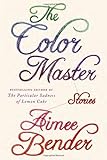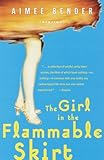 I’ve enjoyed Aimee Bender’s writing since 2005 when I picked up a hardcover of Willful Creatures, her second collection of short stories. I was fourteen at the time, and not a big reader. I read the books that were assigned in school, that’s the best and the worst I could say of it. But I read Bender’s book over and over again. I developed a rhythm to my reading, which soon bordered on ritualism; for the first time in my life it became imperative that I read the book in a certain place, at particular times of day. It seemed possible for some whiff of the environment that hovered around the book to enter it and slightly alter the stories contained in the chrysalis of its twin covers.
I’ve enjoyed Aimee Bender’s writing since 2005 when I picked up a hardcover of Willful Creatures, her second collection of short stories. I was fourteen at the time, and not a big reader. I read the books that were assigned in school, that’s the best and the worst I could say of it. But I read Bender’s book over and over again. I developed a rhythm to my reading, which soon bordered on ritualism; for the first time in my life it became imperative that I read the book in a certain place, at particular times of day. It seemed possible for some whiff of the environment that hovered around the book to enter it and slightly alter the stories contained in the chrysalis of its twin covers.
 Each story in the collection incorporates an element that brazenly, nakedly does not fit. There’s the one about the man with keys for fingers, the son who is born with an anvil for a head, and the woman forced to choose between complete autonomy and raising a family of potatoes. These stories are quirky, creepy, even awkward and gimmicky in parts, the way a fairytale can be when one puts away childish things. The collection opens with the pared-down parable of ten men who go to the doctor and are each told that they have three weeks to live. In “Marzipan,” from Bender’s debut collection The Girl in the Flammable Skirt, a man wakes up with a hole in his stomach one week after his father dies; his wife soon gives birth to her own mother. Bender’s great gift to us all is her fierce unwillingness to give up her childishness. Instead, she grows into it, deepens it, allows it to become old and finicky.
Each story in the collection incorporates an element that brazenly, nakedly does not fit. There’s the one about the man with keys for fingers, the son who is born with an anvil for a head, and the woman forced to choose between complete autonomy and raising a family of potatoes. These stories are quirky, creepy, even awkward and gimmicky in parts, the way a fairytale can be when one puts away childish things. The collection opens with the pared-down parable of ten men who go to the doctor and are each told that they have three weeks to live. In “Marzipan,” from Bender’s debut collection The Girl in the Flammable Skirt, a man wakes up with a hole in his stomach one week after his father dies; his wife soon gives birth to her own mother. Bender’s great gift to us all is her fierce unwillingness to give up her childishness. Instead, she grows into it, deepens it, allows it to become old and finicky.
This courage of stirring, strange, tireless creatures is still present in Bender’s most recent collection, The Color Master, but here their will to play has become somewhat more muted.
The first story in the collection, “Appleless” is the strongest — exquisite, crisp, and deeply unsettling at its core. In it, a woman who does not eat apples is gang raped in an orchard, consumed and enjoyed like a piece of fruit: “We find her in there, and she is so warm and so alive…She is weeping into our arms, she is crumpling down, and we are inside her clothes now, and our hands and mouths are everywhere.” Each story that Bender writes is voiced like a myth. Bender’s writing teaches us that every story is potentially familiar — as if it had been told for centuries and nurtured in many faithful mouths — so long as one tells it just so. For this purpose, she strips the story down to its mythic kernel. The characters have no names. The “we” who carry out the heinous act have apples, and they have their way with “the girl,” yet they are also described as “starving” before and after the act as they sit around eating apples all day. There is such a lack of explanation, of gaining anything, that the story manages to fuse two classic, tragic figures: the one who cannot enjoy what he has, and the one who has metamorphosed so that she cannot enjoy her own body. The entire story can be read in the time it takes to eat an apple.
The subterfuge of mistaken identity that structures “Appleless” (at a metonymic rather than narratological level) motivates every story in Bender’s new collection. Often, the characters write these mistakes into their own lives, impulsively, ecstatically, tragically. In “The Fake Nazi” a man confesses to the police that he was a Nazi, though he never was, out of some misshapen embodiment of collective guilt and grief. An “auburn-haired secretary” finds out about his story and becomes obsessed with discovering each of its moving parts. She feels that members of her generation, born after the Holocaust, unburdened (or burdened in different ways) by its memory, “formed their identities in the negative space instead.” This space is deprived of context, clues, even adequate language; those who inhabit it self-actualize by ratifying their status as “mistake” — the part that does not fit.
In “Faceless” a similar appeal to this negative space, so fitful and yearning in Bender’s earlier work, has degraded into a comforting binary. A young boy named William is diagnosed with “facial illiteracy.” Translation: He has trouble discerning facial expressions, and his mother is not OK with this. It is unclear whether this abnormality stems from a neurological disorder or a social one — his unwillingness to make snap judgments. Embedded in this identity crisis is a thinly veiled and fairly annoying solicitation of the reader to question what it means to be “literate,” to read more closely the world around them (perhaps the book they are gazing upon?)
Which leads me to the main problem I had with this book: too many of its stories are overwrought with anxiety over how to be a good reader and writer. And too often the result is that they fret themselves into a corner, with Bender at times opting for simple, sleepy language that does not dare begin to scale the heights of these actually worrisome questions. This is the risk anyone runs when telling stories with an epic sheen, that they will reflect the moralizing tropes of the ages.
The age that seems to pose the largest problem to Bender, who has the skill to write tenderly about ogres out of space and time, is our own. In “Wordkeepers,” a woman’s vocabulary starts getting away from her. Like so many flimsy, high-gloss magazine articles before her, she implicates technology, lodging a shallow, whiny complaint: “I can’t remember the words of things. The words for words. I have lost my words. What’s this from? Is it the Internet? Texting? E-mail?” No doubt, parts of language have become speedy and surgical to a fault — words are shoved into e-mails, shipped off to ad campaigns, squeezed into the sausage casing of 140 characters per thought. But Bender’s frustration overwhelms her in this story, and she loses her gleeful ability to discover more through play. “In some study, they say phones and computers are replacing our cerebral cortexes, externalizing our thoughts so that we do not need to think them,” Bender writes. But this is as far as she is willing to go; she externalizes the problem only to cower before it.
 This story is wildly different from the tale that best manifests Bender’s anxiety over language in Willful Creatures called “Fruit and Words.” In it, a woman with a craving for mangos discovers a shack fifty miles outside of Vegas. There she finds mangos, and far more than she bargained for — shelves brimming with words, each made from the very thing they signify. “They were piled high on shelves, making big words and small words, crammed close together, letters overlapping,” Bender writes, “They were beautiful on their own and they were beautiful all together.” There is the ocean, piped through a twisting tube that spells “OCEAN”; the word “PEARL” seems, impossibly, carved from a single, opalescent slab of pearl.
This story is wildly different from the tale that best manifests Bender’s anxiety over language in Willful Creatures called “Fruit and Words.” In it, a woman with a craving for mangos discovers a shack fifty miles outside of Vegas. There she finds mangos, and far more than she bargained for — shelves brimming with words, each made from the very thing they signify. “They were piled high on shelves, making big words and small words, crammed close together, letters overlapping,” Bender writes, “They were beautiful on their own and they were beautiful all together.” There is the ocean, piped through a twisting tube that spells “OCEAN”; the word “PEARL” seems, impossibly, carved from a single, opalescent slab of pearl.
The woman decides to buy a word. She picks out the very first word she noticed upon entering the store, “NUT”, made from seven kinds of nuts, as the shopkeeper proudly announces, including “garbanzo”:
“Isn’t garbanzo a bean?” I asked
She held it out to me. “I’ll give it to you for fourteen,” she said. “Two dollars a nut.”
There was a ten in my wallet between four ones and I lifted them all out…”
Later, while perusing the gaseous and emotive words, the narrator runs into a spot of trouble. She accidentally breaks the word “AIR,” and, waving her hand in a protective gesture to shield her from the shopkeeper’s rage, she also breaks “HOPE.” The narrator begins to suspect a scam (the “you break it, you buy it” store policy doesn’t help). There are far too many parts to comment upon in this complex, coruscating tale; so much fodder for another, more exhaustive essay. But I will say this: There is an art to haggling over words.
Bender trades in language like a pro, but this time her hand is shaky, her questions more daunting. Hardly any characters escape the influence of her anxiety. Like the secretary from “The Fake Nazi” who proclaims, “One day you will open your mouth when it is imperative that you use it, and nothing will come out.” Or the opening line of her story “A State of Variance”: “On her fortieth birthday, the woman lost the ability to sleep for more than a single hour.” However, occasionally, there comes along a tyrannical worry, one worth listening to, with the force to launch one thousand brave retellings. For me, this epic scope lives in the line, “It’s unsettling to meet people who don’t eat apples.”








